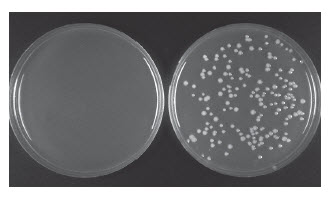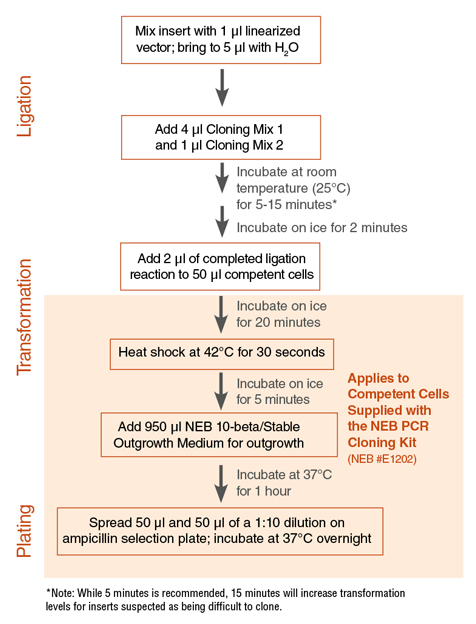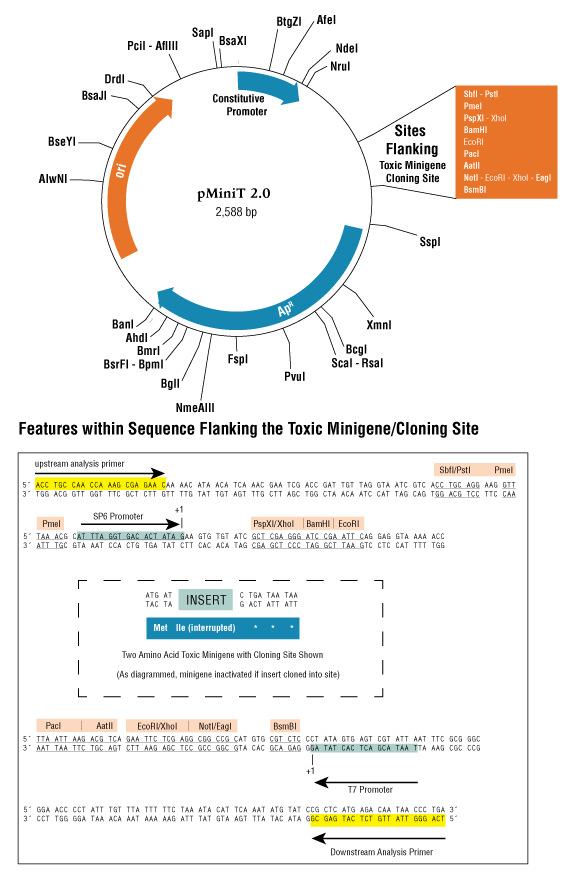NEB® PCR Cloning Kit
Product information| Code | Name | Size | Quantity | Price | |
|---|---|---|---|---|---|
E1202S |
NEB PCR Cloning Kit (incl. competent E. coli) |
20 rxns | - | Unavailable in your region |
NEB® PCR Cloning Kit
Allows for in vitro transcription. Also available without competent cells.
Supplied with outgrowth medium optimized for NEB 10-beta & NEB Stable Competent E.coli ; please do not use SOC outgrowth medium.
Product Introduction
Easy cloning of all PCR products, including blunt and TA ends
- Updated to allow for in vitro transcription with both SP6 and T7 promoters
- BsaI-site removed from the ampicillin-resistant gene (allows for the cloning of Golden Gate Assembly modules)
- Fast cloning experiments with 5-minute ligation step
- Simplified screening with low/no colony background and no blue/white selection required
- Save time by eliminating purification steps
- Flanking restriction sites available for easy subcloning, including choice of two single digest options
- Provided analysis primers allow for downstream colony PCR screening or sequencing
- Ready-to-use kit components include 1 kb control amplicon, linearized cloning vector and single-use competent E. coli
- Longer shelf life (12 months), as compared to some commercially available products
- Includes competent cells
- More restriction sites added, including four 8-base cutters
| Catalog # | Size | Concentration |
|---|---|---|
| E1202S | 20 reactions |
Featured Videos
View Video Library- Product Information
- Protocols, Manuals & Usage
- FAQs & Troubleshooting
- Citations & Technical Literature
- Quality, Safety & Legal
- Other Products You May Be Interested In
Product Information
Description
This PCR Cloning Kit contains an optimized Cloning Mix containing a proprietary ligation enhancer and a linearized vector that uses a novel mechanism for background colony suppression to give a low background. It allows simple and quick cloning of any PCR amplicon, whether the amplification reactions are performed with proofreading DNA polymerases, such as Q5® which produce blunt ends; or nonproofreading DNA polymerases, such as Taq or Taq mixes (OneTaq®, LongAmp® Taq) which produce single base overhangs. This is possible due to “invisible” end polishing components in the master mix that are active during the ligation step only if needed. The kit also allows direct cloning from amplification reactions without purification, and works well whether or not the primers used in the PCR possess 5´-phosphate groups. To learn more about how the kit works, please view our video.
The ultimate in flexibility: clone with any amplicon made with any DNA polymerase, with or without 5´ phosphates, purified or not!



Map shown above displays the construct formed if no insert is present. Unique restriction sites are shown in black. Additional restriction sites that can be used for subcloning are shown in red. Expanded box below shows location of sequencing primers, restriction sites for subcloning, and placement of insertion site within the toxic minigene.
- This product is related to the following categories:
- DNA Assembly, Cloning and Mutagenesis Kits,
Kit Components
Kit Components
The following reagents are supplied with this product:
| NEB # | Component Name | Component # | Stored at (°C) | Amount | Concentration | |||||||||||||||||||||||||||||||||||||||||||||||||||||||||||||
|---|---|---|---|---|---|---|---|---|---|---|---|---|---|---|---|---|---|---|---|---|---|---|---|---|---|---|---|---|---|---|---|---|---|---|---|---|---|---|---|---|---|---|---|---|---|---|---|---|---|---|---|---|---|---|---|---|---|---|---|---|---|---|---|---|---|---|
| ||||||||||||||||||||||||||||||||||||||||||||||||||||||||||||||||||
Properties & Usage
Storage Notes
- The kit is shipped on dry ice. Upon arrival, store the competent cells (in the large exterior box) at -80°C, the components in the small interior box at -20°C and the NEB™ 10-beta/Stable Outgrowth Medium at room temperature or 4°C.
Features
- In vitro transcription with both SP6 and T7 promoters
- BsaI-site removed from the ampicillin-resistant gene (allows for the cloning of Golden Gate Assembly modules)
- Easy cloning of all PCR products, including blunt and TA ends
- Fast cloning experiments with 5-minute ligation step
- Simplified screening with low/no colony background and no blue/white selection required
- Save time by eliminating purification steps
- Flanking restriction sites available for easy subcloning, including choice of two single digest options
- Provided analysis primers allow for downstream colony PCR screening or sequencing
- Ready-to-use kit components include 1 kb control amplicon, linearized cloning vector and single-use competent E. coli
- Longer shelf life (12 months), as compared to some commercially available products
Related Products
Companion Products
- Quick-Load® Purple 1 Kb Plus DNA Ladder
- LongAmp® Taq 2X Master Mix
- OneTaq® 2X Master Mix with Standard Buffer
- LongAmp® Taq DNA Polymerase
- OneTaq® DNA Polymerase
- Deoxynucleotide (dNTP) Solution Mix
- NEB® 10-beta Competent E. coli (High Efficiency)
- HiScribe®; T7 ARCA mRNA Kit
- HiScribe®; T7 ARCA mRNA Kit (with tailing)
- HiScribe®; T7 Quick High Yield RNA Synthesis Kit
- HiScribe® T7 High Yield RNA Synthesis Kit
- SP6 RNA Polymerase
- T7 RNA Polymerase
- Ribonucleotide Solution Mix
- RNase Inhibitor, Murine
- RNase Inhibitor, Human Placenta
Product Notes
- The NEB PCR Cloning Kit contains a sufficient supply of materials to perform 20 x 10 μl cloning reactions. Primers are also provided, allowing screening for inserts by colony PCR and/or sequencing.
References
- Wang, Y. et al. (2004). Nucleic Acids Research. 32, 1197-1207.
- Heurgue-Hamard, V. et al. (2000). The EMBO Journal. 19, 2701-2709.
- Tenson, T. et al. (1999). Journal of Bacteriology. 181, 1617-1622.
Protocols, Manuals & Usage
Protocols
Manuals
Usage & Guidelines
FAQs & Troubleshooting
FAQs
- How does the NEB® PCR Cloning Kit work?
- How can the cloning vector work with both blunt-ended amplicons and single-base overhang-containing amplicons?
- Do these polishing components present in the master mix affect my cloning efficiency if my insert already has blunt ends?
- Do my inserts have to possess 5´ phosphates?
- Can the cloning kit be used for inserts that are not necessarily PCR amplicons?
- Can the cloning kit be used with inserts containing 5´ or 3´ overhangs greater than the single-base overhang achieved by PCR with Taq DNA polymerase?
- Can I use the NEB PCR Cloning Kit featuring pMiniT 2.0 for Golden Gate Assembly?
- Does the PCR product need to be purified?
- Can I use a different competent E. coli strain than the provided NEB 10-beta strain?
- How can I maximize the number of transformants?
- Can I scale down the reactions to use less vector?
- Are there limits regarding the size of inserts that can be cloned?
- Are the NEB 10-beta Competent E. coli (Cloning Efficiency) provided in the kit the same cells as NEB 10-beta Competent E. coli (High Efficiency)?
- How can I determine if my NEB 10-beta cells are competent?
- Can Cloning Mix 1 and Cloning Mix 2 be mixed together before adding them to the ligation reaction?
- Where are the +1 transcription positions for the SP6 and T7 promoters for in vitro transcription and translation located?
- What is the difference between the original pMiniT and the pMiniT 2.0 linearized vector backbone now provided in the kit?
- When cloning a PCR fragment into the pMiniT 2.0 vector provided with the NEB PCR cloning kit, where in the multiple cloning site (MCS) of the vector is the insert ligated?
Tech Tips
1. Follow the protocol: The protocol has been highly optimized to have a low background; if you have inadvertently deviated from the optimized protocol (e.g., extended ligation incubation, overly-concentrated outgrowth), compensate by plating less outgrowth (< 50 µl) - Plating too much of the outgrowth can increase background, and cause problems with colony PCR. If you need more colonies, spread 50 µl of outgrowth onto each of multiple plates.
2. Important to stop ligations: If you wish to store your ligations to allow transformations at a later time, make sure your freezer is cold enough (- 20°C) to freeze the ligations. Or, you may quick freeze with a dry ice/alcohol bath before transferring the samples to -20°C. If you find your freezer-stored ligations have remained in liquid form, this may have allowed further low-level ligation of the vector backbone to occur. In this circumstance, plate less outgrowth (< 50 µl).
3. Do not incubate the transformation plates at room temperature. The slow growth rate of the cells at room temperature will increase the number of background colonies.
4. Add the cloning mixes 1 and 2 to the reaction last. Some people try to save time by preparing a mix of water, ligation master mix and pMiniT, aliquoting this to tubes and adding the insert DNA. This allows pMiniT to recircularize, since ligation can begin before the amplicon is added, and this may result in lower cloning efficiency.
Citations & Technical Literature
Citations
Additional Citations
Quality, Safety & Legal
Quality Assurance Statement
Quality Control tests are performed on each new lot of NEB product to meet the specifications designated for it. Specifications and individual lot data from the tests that are performed for this particular product can be found and downloaded on the Product Specification Sheet, Certificate of Analysis, data card or product manual. Further information regarding NEB product quality can be found here.Specifications
The Specification sheet is a document that includes the storage temperature, shelf life and the specifications designated for the product. The following file naming structure is used to name these document files: [Product Number]_[Size]_[Version]Certificate Of Analysis
The Certificate of Analysis (COA) is a signed document that includes the storage temperature, expiration date and quality controls for an individual lot. The following file naming structure is used to name these document files: [Product Number]_[Size]_[Version]_[Lot Number]- E1202S_v1_10010006
- E1202S_v2_10013432
- E1202S_v2_10014790
- E1202S_v1_10015845
- E1202S_v2_10018359
- E1202S_v2_10020251
- E1202S_v2_10023176
- E1202S_v2_10024962
- E1202S_v2_10028550
- E1202S_v2_10032576
- E1202S_v2_10033152
- E1202S_v2_10034345
- E1202S_v2_10036756
- E1202S_v2_10039414
- E1202S_v2_10040464
- E1202S_v2_10046432
- E1202S_v2_10048229
- E1202S_v2_10049089
- E1202S_v2_10052227
- E1202S_v2_10056806
- E1202S_v2_10060043
- E1202S_v2_10061596
- E1202S_v2_10063709
- E1202S_v2_10068475
- E1202S_v2_10077116
- E1202S_v2_10078316
- E1202S_v2_10082505
- E1202S_v2_10086891
- E1202S_v2_10090057
- E1202S_v2_10096761
- E1202S_v2_10100367
- E1202S_v2_10105522
- E1202S_v2_10111596
- E1202S_v2_10117515
- E1202S_v2_10123922
- E1202S_v2_10131782
- E1202S_v2_10140752
- E1202S_v2_10147353
- E1202S_v2_10153046
- E1202S_v2_10159148
- E1202S_v2_10166788
- E1202S_v2_10172954
- E1202S_v2_10180568
- E1202S_v2_10190198
- E1202S_v2_10199285
- E1202S_v2_10206103
- E1202S_v2_10212196
- E1202S_v1_0711803
- E1202S_v2_0711803
- E1202S_v2_10221510
- E1202S_v2_10229607
- E1202S_v2_10242791
- E1202S_v2_10252432
- E1202S_v2_10263623
- E1202S_v2_10274382
- E1202S_v2_10285231
- E1202S_v2_10300253
Safety DataSheets
The following is a list of Safety Data Sheet (SDS) that apply to this product to help you use it safely.Linearized pMiniT™ 2.0 Vector
Cloning Analysis Forward Primer
Cloning Analysis Reverse Primer
Amplicon Cloning Control
pUC19 Vector
Cloning Mix 1
Cloning Mix 2
NEB® 10-beta/Stable Outgrowth Medium
NEB® 10-beta Competent E. coli (Cloning Efficiency)
Legal and Disclaimers
Products and content are covered by one or more patents, trademarks and/or copyrights owned or controlled by New England Biolabs, Inc (NEB). The use of trademark symbols does not necessarily indicate that the name is trademarked in the country where it is being read; it indicates where the content was originally developed. The use of this product may require the buyer to obtain additional third-party intellectual property rights for certain applications. For more information, please email busdev@neb.com.This product is intended for research purposes only. This product is not intended to be used for therapeutic or diagnostic purposes in humans or animals.
New England Biolabs (NEB) is committed to practicing ethical science – we believe it is our job as researchers to ask the important questions that when answered will help preserve our quality of life and the world that we live in. However, this research should always be done in safe and ethical manner. Learn more.
Trademarks
ONETAQ®, Q5®, QUICK-LOAD®, NEB® and NEW ENGLAND BIOLABS® are registered trademarks of New England Biolabs, Inc.LONGAMP™ and PMINIT™ are trademarks of New England Biolabs, Inc.
PHUSION® is a registered trademark and property of Thermo Fisher Scientific.
Phusion® DNA Polymerase was developed by Finnzymes Oy, now a part of Thermo Fisher Scientific.
Other Products You May Be Interested In
The supporting documents available for this product can be downloaded below.




